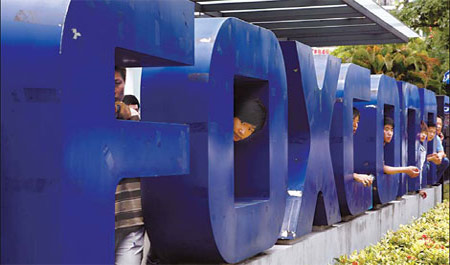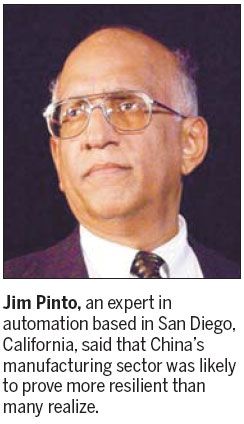Economy
'Made in China' - but for how long?
By Andrew Moody (China Daily)
Updated: 2010-07-19 09:22
 |
Large Medium Small |
|
 |
|
Employees at Hon Hai's Foxconn plant peer out from the back of a company sign in Shenzhen. Foxconn, which makes iPhones and iPads for Apple at its factory in the southern Chinese city, increased labor rates by 70 percent recently after a spate of suicides among workers.[China Foto Press] |
Analysts question future of China's manufacturing as labor costs rise
BEIJING - How long will companies be able to afford to manufacture in China? That such a question can be asked would have seemed absurd until very recently.
For the past decade and more, China has been the manufacturing workshop of the world.
Last year, according to IHS Global Insight, the leading financial research company, China exported some $1.7 trillion of goods, 80 percent of which were manufactured in factories, and is set to end the United States 110-year reign as the world's leading manufacturer some time next year.
All has not been well in China's manufacturing heartlands in recent months, however. Foxconn, which makes iPhones and iPads for Apple at its factory in Shenzhen, increased labor rates by 70 percent recently after a spate of suicides among workers.
Manufacturing wages across China have increased by 14 percent over the past year (see inside cover story), making the prospect of producing goods in nearby Southeast Asian countries such as Vietnam or in Bangladesh, Sri Lanka and even Africa seem a viable alternative.
Two large US companies, Ann Taylor Stores, the women's clothing retailer, and Coach, the luxury handbag maker, are poised to relocate production to countries, where labor rates are cheaper.
Mike Devine, chief financial officer of New York-headquartered Coach, which makes luxury hand bags, said at a conference recently a move was in the pipeline.

"We are looking to move production into lower-cost geographies, most notably Vietnam and India," he said.
Michael Nicholson, chief financial officer of Anne Taylor Stores, also told the Wall Street Journal recently the company was assessing the quality of production sites in other countries.
A recent survey by EEF, Britain's leading manufacturing association, said one in seven of its members were looking at shifting production back to the UK, fed up with problems in countries such as China.
"Getting goods of the right quality, issues such as time to market and rising fuel costs have been driving this trend," said Lee Hopley, EEF's chief economist.
|
||||
"Strikes happen all the time. The current generation of workers have higher aspirations than perhaps their parents had," he said.
Thun also believes current labor cost pressures could be a catalyst for change in China.
"One of the problems that China historically has faced is that it has never been pushed into innovation-based activities because of this excess supply of labor," he said.
"Pushing manufacturing into high value-added activity is very much what the government wants. This kind of cost pressure stimulates upgrading."



